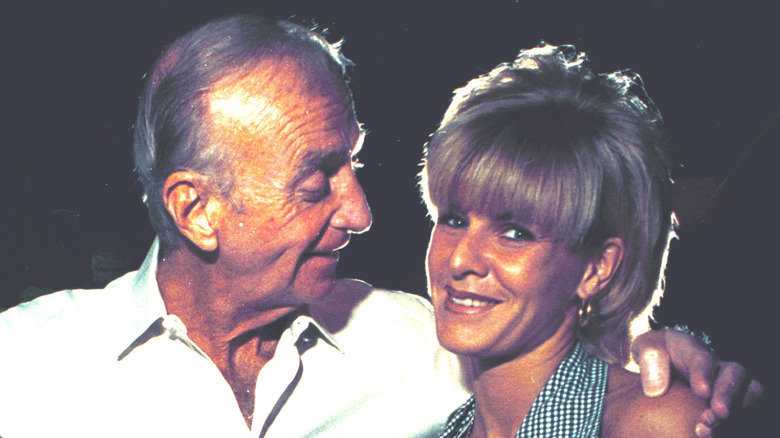The Secret That Casino Subject Lefty Rosenthal Brought To His Grave
"The only part that's fun about gambling is when you win. Other than that, people might say the challenge is interesting, and most people enjoy the challenge, but the name of the game is win," infamous Las Vegas mobster Frank "Lefty" Rosenthal once told PBS. If you don't recognize Rosenthal's name, you might recognize parts of his story if you've ever seen Martin Scorsese's 1995 crime/mob drama "Casino" (per IMDb). In the film, Sam "Ace" Rothstein (portrayed by Robert De Niro) represents a good bulk of Rosenthal's real-life exploits in Las Vegas throughout the '60s and '70s. By his own admission, the man was a gambler through and through, and not just with money.
According to Las Vegas Review-Journal, Frank Rosenthal embarked upon a rather scandalous gambling venture behind closed quarters that nobody — especially not his closest crime associates — knew about. The truth of the matter didn't come out until after he died in 2008 at the age of 79, and that's probably a good thing, because if any of his former mobster friends had learned of the wager he'd cast while he was still an active criminal, he probably wouldn't have died of natural causes. But first, a word on Rosenthal's personal history.
Who was Lefty Rosenthal?
As All That's Interesting reports, Frank Rosenthal was born in Chicago on June 12, 1929. As a young man, he became deeply embedded in the city's illegal gambling circuit and was incredibly adept at calculating numbers, odds, outcomes, and (eventually) fixing various competitions. After enough time, he set his sights on the mecca of all things illustrious and decadent: Las Vegas, Nevada. Through the aid of organized crime and prior Chicago associates, he quickly ascended the ranks of the Vegas gambling circuit and was running several casinos by the time the early 1970s rolled around. The city was a stage, and he was its puppet master. As he once remarked to one of his associates, "If you interfere with any of the casino operations or try to undermine anything I want to do here, I represent to you that you will never leave this corporation alive" (per All That's Interesting).
However, after enough time, all empires must crumble. Rosenthal became the focal point of government surveillance and legal heat. Violence, intimidation, and corruption were the axis powers of his criminal kingdom, and in 1976, the Nevada Gambling Commission had entirely excommunicated him from any and all betting enterprises. His cronies were being picked off by police and rival mob members, and he was eventually forced to flee the city. Rosenthal ultimately found a quiet life in Florida to settle into alongside his children and lived out the rest of his days in peace (via All That's Interesting).
Lefty Rosenthal's solemn secret
In 2008, Rosenthal (above, mid-1990s) suffered a massive heart attack that took his life. In years prior, he made a living as a nightclub manager and oversaw a small online betting site (via All That's Interesting). His life remained quaint and unhaunted by his earlier days in Las Vegas, but some couldn't help but wonder how he evaded serious jail time or legal ramifications. It may have had something to do with the fact that for years, Lefty Rosenthal was secretly an FBI informant.
As Vital Vegas reports, the man who once ran the Stardust hotel/casino and built a legacy as one of the most notorious criminals in Las Vegas history was living a double-life as a snitch for the same people who sought to destroy his criminal monument. Nobody knows exactly when Rosenthal started talking to the FBI or precisely what information he kicked up to them, but this shrouded piece of the man's history certainly would have made for an interesting little extension to "Casino's" story; in which case we probably would have wound up with a movie that looked more like "The Departed" than "Goodfellas" (per Las Vegas Review-Journal).


